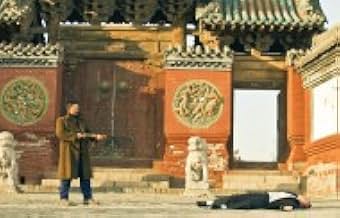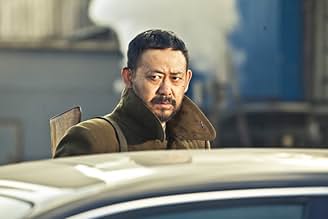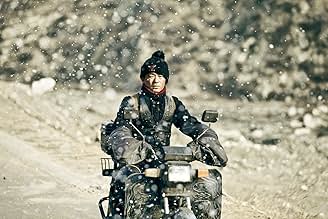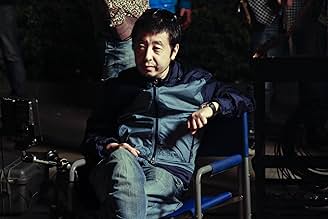Four independent stories set in modern China about random acts of violence.Four independent stories set in modern China about random acts of violence.Four independent stories set in modern China about random acts of violence.
- Awards
- 18 wins & 12 nominations total
Featured reviews
After some moments of silence, the master of the sixth generation of Chinese filmmakers, Jia Zhangke returns with his newest feature "A Touch of Sin" (2013) which might just be his darkest work to date. It's an intriguing film of sheer brilliance told through the complexity of several, loosely connected stories about people in agony. While some fans of the director may be disappointed by the lack of clairvoyant lyric beauty, characteristic for example for "Still Life" (2006), others may find the narrative ambiguity and incoherence rather enriching.
The film begins with an enigmatic scene at a deserted rural highway where a truck carrying tomatoes has fallen over. A cold sense of brutality breathes in the air. Soon the first characters are introduced and we learn that, in the same way as in "Still Life", "A Touch of Sin" is structured from different stories with different human fates. In brief, it tells the story of four random acts of violence in today's society.
Although the stories lack obvious connection, they all share a few essential elements. First of all, they all escalate to an outburst of violence. Second, all of them are tales of social rootlessness and existential alienation. The latter remark is congruous with the fact that in all of Zhangke's films the general aspect meets the particular in a poignant fashion of chill and solitude. Individuals live in their personal prisons while the modernization of the society brings nothing but empty freedom. In other words, they live in spaces that are both private and public where they feel utterly detached. No one belongs anywhere in the Zhangke universe.
Due to the complexity of several stories, the film also includes more than one central milieu. However, this seemingly arbitrary set of different settings of hotels and a coal miners' town do tell us about veritably similar subjects. All the spaces are haunted by the same problems. Such conflict of ambiguity and coherence should not frighten the spectator. Since instead of a straight-forward narrative with clear character delineation, Zhangke offers us a fascinatingly cynical cross-section of the contemporary Chinese society which is, on the one hand, characterized by economic boom to whose technological wonderland an individual may vanish, and, on the other, the tormenting but also comforting legacy of Mao.
Modern Chinese way of life appears to Zhangke as something diverse -- as something that is in a constant state of change. Like in his previous features, Zhangke once again focuses on the transforming reality, the current flow, and its consequences on the individuals. Although this was already done to an extent in "Still Life" through the complexity of two overlapping stories, it also cast hope in humanity, whereas "A Touch of Sin" is far more pessimistic.
Once again Zhangke's aesthetics of cinema is characterized by the elements of silence and emptiness in the images of loneliness and alienation. It is as though everything had died. Only violence is portrayed passionately, all the rest is understated. The violence in "A Touch of Sin" is raw and brutal, but essentially stripped. Above all, violence appears as a melancholic undertone of some kind which reveals the realities of the society.
Even if the opaque and complex narrative of "A Touch of Sin" left the viewer speechless and unable to describe what he or she had just seen, there is always something profound to admire in Zhangke's cinema. In his films there is always that certain mood which is quite difficult to be put in words. In brief, it is a mood of emptiness, but also of utter richness.
The film begins with an enigmatic scene at a deserted rural highway where a truck carrying tomatoes has fallen over. A cold sense of brutality breathes in the air. Soon the first characters are introduced and we learn that, in the same way as in "Still Life", "A Touch of Sin" is structured from different stories with different human fates. In brief, it tells the story of four random acts of violence in today's society.
Although the stories lack obvious connection, they all share a few essential elements. First of all, they all escalate to an outburst of violence. Second, all of them are tales of social rootlessness and existential alienation. The latter remark is congruous with the fact that in all of Zhangke's films the general aspect meets the particular in a poignant fashion of chill and solitude. Individuals live in their personal prisons while the modernization of the society brings nothing but empty freedom. In other words, they live in spaces that are both private and public where they feel utterly detached. No one belongs anywhere in the Zhangke universe.
Due to the complexity of several stories, the film also includes more than one central milieu. However, this seemingly arbitrary set of different settings of hotels and a coal miners' town do tell us about veritably similar subjects. All the spaces are haunted by the same problems. Such conflict of ambiguity and coherence should not frighten the spectator. Since instead of a straight-forward narrative with clear character delineation, Zhangke offers us a fascinatingly cynical cross-section of the contemporary Chinese society which is, on the one hand, characterized by economic boom to whose technological wonderland an individual may vanish, and, on the other, the tormenting but also comforting legacy of Mao.
Modern Chinese way of life appears to Zhangke as something diverse -- as something that is in a constant state of change. Like in his previous features, Zhangke once again focuses on the transforming reality, the current flow, and its consequences on the individuals. Although this was already done to an extent in "Still Life" through the complexity of two overlapping stories, it also cast hope in humanity, whereas "A Touch of Sin" is far more pessimistic.
Once again Zhangke's aesthetics of cinema is characterized by the elements of silence and emptiness in the images of loneliness and alienation. It is as though everything had died. Only violence is portrayed passionately, all the rest is understated. The violence in "A Touch of Sin" is raw and brutal, but essentially stripped. Above all, violence appears as a melancholic undertone of some kind which reveals the realities of the society.
Even if the opaque and complex narrative of "A Touch of Sin" left the viewer speechless and unable to describe what he or she had just seen, there is always something profound to admire in Zhangke's cinema. In his films there is always that certain mood which is quite difficult to be put in words. In brief, it is a mood of emptiness, but also of utter richness.
This film exposes the difficulties of a few characters in various Chinese provinces - people of average circumstances just trying to get by. Their stories are based on true events.
This film is suitably shocking in many ways in exposing not only the difficulties of the characters in focus but also the extreme reactions some of them have in dealing with their circumstances. The most creepy aspect is the absence of any authorities or help given to those who need it. This was intended by director Jia Zhang-Ke to expose modern life in China.
While there are powerful scenes in this movie, it seemed confusing at times and not fully coherent and a bit long at over two hours. But credit can be given to the boldness of exposing so much in a totalitarian regime. - dbamateurcritic
This film is suitably shocking in many ways in exposing not only the difficulties of the characters in focus but also the extreme reactions some of them have in dealing with their circumstances. The most creepy aspect is the absence of any authorities or help given to those who need it. This was intended by director Jia Zhang-Ke to expose modern life in China.
While there are powerful scenes in this movie, it seemed confusing at times and not fully coherent and a bit long at over two hours. But credit can be given to the boldness of exposing so much in a totalitarian regime. - dbamateurcritic
The first minute of this film is better than entire acclaimed English-speaking movies of the year I'm watching it; 2020. But the film is ultimately disappointing.
Every movie director can take nice pictures, but this is a film of not only stunning visuals but stunning visuals time and again imbued with meaning in relation to society and environment.
The film is actually several separate short stories. Short stories can be perfect ideas uncorrupted by the extrapolation necessary for full-length films. But these short films reveal the weakness in lack of depth usually associated with the short film form: the limited time in which, with depth, to tell a tale.
Each of the main characters are victims of their situation, exploited by others in positions of authority in a society built this way. The users are not seen as such by the general mass of the people, who the director shows as dumb animals, most clearly in a scene with a mistreated animal in relation to the scene that it follows.
Though the short films are fleshed-out snapshots, they are snapshots all the same, wasting the promise of meaning imbued in single images. But the great failing is the lack of resolution to each story. A fatuous comeuppance is stuck on almost all as the director takes the easy way out.
These dim-witted "resolutions" are as if these days to end a film this way is more than acceptable, it is acclaimed. It is too easy to simply give up and do a Tarantino. The stories haven't quite lived up to their potential and then are given up on.
Still, despite its flaws, what is good about the film shows a great filmmaker at work.
Every movie director can take nice pictures, but this is a film of not only stunning visuals but stunning visuals time and again imbued with meaning in relation to society and environment.
The film is actually several separate short stories. Short stories can be perfect ideas uncorrupted by the extrapolation necessary for full-length films. But these short films reveal the weakness in lack of depth usually associated with the short film form: the limited time in which, with depth, to tell a tale.
Each of the main characters are victims of their situation, exploited by others in positions of authority in a society built this way. The users are not seen as such by the general mass of the people, who the director shows as dumb animals, most clearly in a scene with a mistreated animal in relation to the scene that it follows.
Though the short films are fleshed-out snapshots, they are snapshots all the same, wasting the promise of meaning imbued in single images. But the great failing is the lack of resolution to each story. A fatuous comeuppance is stuck on almost all as the director takes the easy way out.
These dim-witted "resolutions" are as if these days to end a film this way is more than acceptable, it is acclaimed. It is too easy to simply give up and do a Tarantino. The stories haven't quite lived up to their potential and then are given up on.
Still, despite its flaws, what is good about the film shows a great filmmaker at work.
This is a Chinese film written and directed by Jia Zhangke. There are four stories about four characters in modern China. They each face the corrupted modern world with violence. Jia based each story on a real event ripped from the headlines.
The most compelling one has to be Dahai. It's the performance of Wu Jiang. There is a real power in his presence. I would prefer the whole movie staying with him. It's not as simple as rooting for him. Quite frankly, it's hard to root for the guy after he shoots a kid. It reminds me of Michael Douglas in Falling Down. I had a hard time staying with the other stories. I kept waiting to reconnect with the Dahai story. I appreciate the idea of an anthology film. It's often the case that one stands out among the crowd. I always pine for more from one over the others.
The most compelling one has to be Dahai. It's the performance of Wu Jiang. There is a real power in his presence. I would prefer the whole movie staying with him. It's not as simple as rooting for him. Quite frankly, it's hard to root for the guy after he shoots a kid. It reminds me of Michael Douglas in Falling Down. I had a hard time staying with the other stories. I kept waiting to reconnect with the Dahai story. I appreciate the idea of an anthology film. It's often the case that one stands out among the crowd. I always pine for more from one over the others.
Beautiful movie about living at the bottom of the economic class may lead to random violent acts of aggression - as your only way of releasing the anger inside - , it was close but didn't quite make it ..
Story could have been told more visually , with less but useful dialogue , as the cinematography and beauty within the scenes are amazing . But like most art-houses the story doesn't fully add up . -----------------------------------------------------
Part 1: A man living in a village getting drained by the coal mine industry reaches his ultimate limit - and takes out everyone involved in the corporate scandal 8/10
Part 2: A motorcyclist with an excitement to gun violence ; sibling in an aging family, he "robs" people as his way of making a living 5/10
Part 3: A woman is having an affair with a married man but calls it quits for fear it'll ruin her image . Being false accused for being a slut , she makes a drastic decision. 6.5/10
Part 4: A kid gets blamed for injuring a coworker and has to pay his debt through checks for the next 100 days . He calls quits instead and decides to fall in love with a sex worker during his free time . When his life reaches a dead end he decides to end it there . 7.5/10
Overall 7/10 6/10 Script 9/10 Level of Violence 11/10 Violence Shock Value (Realism of Violence) 100/10 Beauty of the Cinematography
Story could have been told more visually , with less but useful dialogue , as the cinematography and beauty within the scenes are amazing . But like most art-houses the story doesn't fully add up . -----------------------------------------------------
Part 1: A man living in a village getting drained by the coal mine industry reaches his ultimate limit - and takes out everyone involved in the corporate scandal 8/10
Part 2: A motorcyclist with an excitement to gun violence ; sibling in an aging family, he "robs" people as his way of making a living 5/10
Part 3: A woman is having an affair with a married man but calls it quits for fear it'll ruin her image . Being false accused for being a slut , she makes a drastic decision. 6.5/10
Part 4: A kid gets blamed for injuring a coworker and has to pay his debt through checks for the next 100 days . He calls quits instead and decides to fall in love with a sex worker during his free time . When his life reaches a dead end he decides to end it there . 7.5/10
Overall 7/10 6/10 Script 9/10 Level of Violence 11/10 Violence Shock Value (Realism of Violence) 100/10 Beauty of the Cinematography
Did you know
- TriviaJia Zhang-ke: in the third story as a patron of the brothel. He is shown walking down a hallway from behind talking on his cell phone and smoking a cigar. At the end of the shot he turns to survey the line of girls in the hallway.
- ConnectionsFeatured in At the Movies: Episode #10.23 (2013)
- How long is A Touch of Sin?Powered by Alexa
Details
- Release date
- Countries of origin
- Official site
- Languages
- Also known as
- Touch of Sin
- Filming locations
- Chongqing, China(San'er episode)
- Production companies
- See more company credits at IMDbPro
Box office
- Gross US & Canada
- $154,120
- Opening weekend US & Canada
- $19,867
- Oct 6, 2013
- Gross worldwide
- $854,891
- Runtime
- 2h 10m(130 min)
- Color
- Sound mix
- Aspect ratio
- 2.35 : 1
Contribute to this page
Suggest an edit or add missing content















